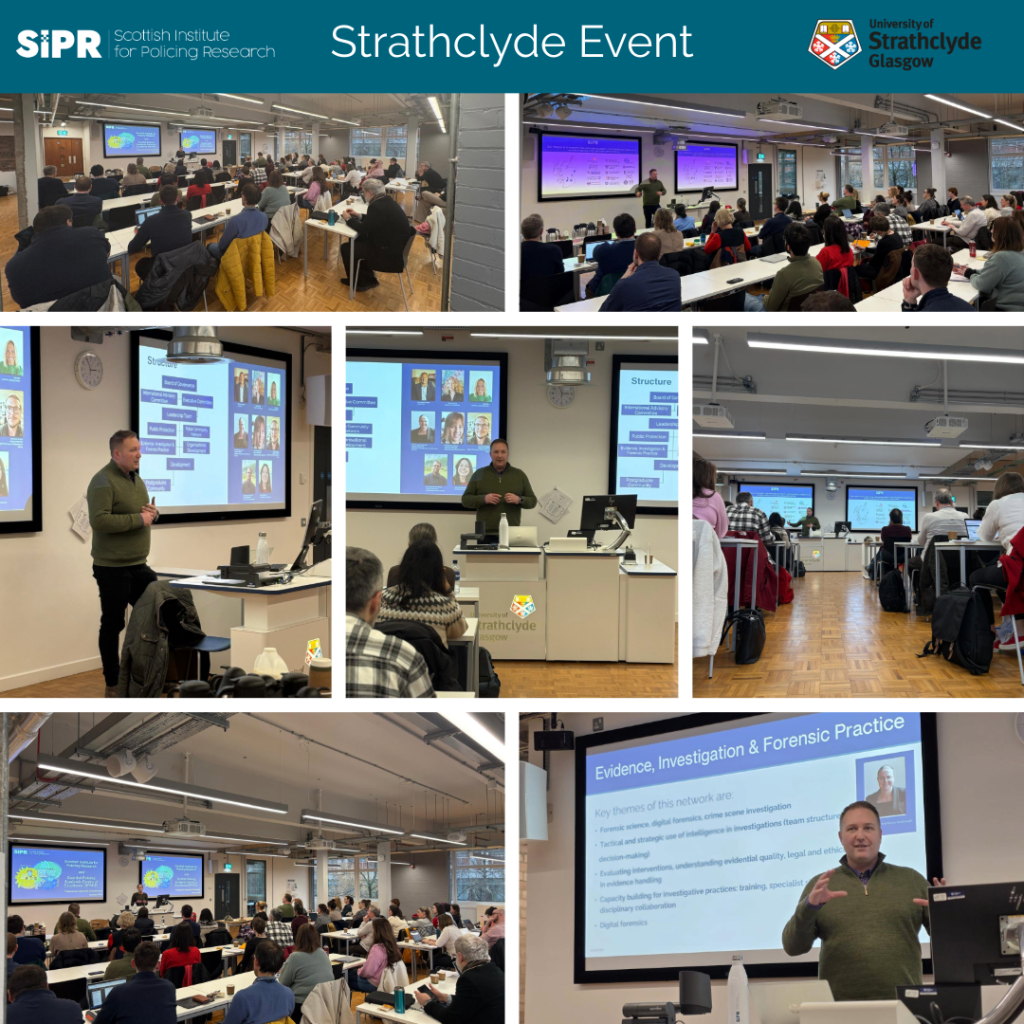FIVE PhD students have become the first recipients of a Scottish Justice Fellowship which will see them turn their theses into research summaries and associated materials for policy makers and practitioners.
We are delighted to announce the Fellows: Emma Forbes, Kirsty Deacon and Annie Crowley (all University of Glasgow), Shane Horgan (University of Edinburgh) and Fern Gillon (University of Strathclyde). The Fellows will be covering topics including cybercrime and security, domestic abuse, imprisonment’s impact on families, early intervention in youth justice, and working with at risk young women.
They will each receive £3,000 in funding and mentoring support throughout their six-month fellowship.
The Scottish Justice Fellowships are a unique initiative funded by the Scottish Government in partnership with the Scottish Centre for Crime and Justice Research (SCCJR) and the Scottish Institute for Policing Research (SIPR). The main purpose of the fellowships is to put academic research into action through innovative means including textual, visual and audio materials.
Cabinet Secretary for Justice Humza Yousaf said:
“The Scottish Government is committed to ensuring that the best available evidence can inform our policy and decision-making and I recognise the important contribution that academic research can make to this process.
“I am delighted we are working with academic partners on this innovative project to help draw on previously untapped PhD research that can inform our work to strengthen Scotland’s justice system and help keep communities safe.”
Sarah Armstrong, Director of the Scottish Centre for Crime and Justice Research, said, “We are excited by this opportunity that puts research to work. PhDs represent years of intensive study, and too often sit on a library shelf. This initiative brings the latest research to bear on problems of real concern, developing evidence that can inform policy and practice, and contribute to building just societies.”
Liz Aston, Director of the Scottish Institute for Policing Research, said, “We are delighted to support this venture, which will enhance knowledge exchange, contribute to the development of evidence informed practice and policy making, and support the development of early career researchers.”
FOR FURTHER DETAILS, SEE THE ORIGINAL ANNOUCNEMENT OF THE “CALL” BELOW
********************************************************
The Scottish Government, the Scottish Centre for Crime and Justice Research (SCCJR) and the Scottish Institute for Policing Research (SIPR) are offering short-term fellowships to PhD students in Scotland to turn their thesis into research summaries and associated materials for policy makers and practitioners.
There is substantial untapped resource in PhDs completed in Scotland on policing, crime, justice and related issues (e.g. healthcare in justice settings, domestic violence) and we are seeking to support further knowledge exchange and dissemination.
These fellowships will be available from autumn 2018 and would be for those recently completed (within 2 years), or nearing completion (within three months to submission) of a PhD. Students at all Scottish Universities are eligible to apply.
The main purpose of the fellowships is to distil the key findings from the PhD thesis and to consider how best to communicate with the main audiences using written, visual and oral presentation, including traditional publication forms as well as social media. However, we are not seeking to support applications that are solely to turn thesis into an academic paper for a journal.
The funding for the fellowships will be for £3,000. This can be either a full time or part time commitment, but they must be completed within 6 months of commencement. In addition to the £3,000 the Fellowships involve:
- A writers retreat/workshop to develop skills in writing for a policy or practice audience
- A session with Scottish Government policy makers and analysts on why, how and when they need evidence and what they find most useful
- Mentoring, support and hosting (computer and library access) from one of the member universities of SCCJR or SIPR, the academic partners of this initiative
- Comments on summary/outputs from SG partner in the policy area of interest
- Publication of outputs by SCCJR as part of a Fellowship series, with cross publication of policing relevant projects on the SIPR website
- The opportunity to present your work at a mini-conference in spring 2019 with other successful applicants
Applying
We are seeking applications by Friday 14th September 2018 (12 noon) to start from October 2018 and to end no later than March 2019. We expect to fund around 5-6 awards this year.
Applicants should set out in a maximum of two sides of A4:
- Your PhD title, degree institution and supervisors
- The theme and key questions of your PhD and some emerging key findings
- The potential audiences for your work across policy and practice
- A provisional description of the likely nature and number of outputs, for example briefing/research highlights papers, practice toolkit, visual display of information, social media content.
- Timetable
Your application should be sent to HeadofJAS@gov.scot
Outputs
The outputs will form part of a series hosted by SCCJR.
Application Assessment
A panel composed of SG Justice Analytical Services, SCCJR and SIPR representatives will review the applications. We are expecting candidates to demonstrate:
Clarity of expression in explaining the PhD topic and key questions
Relevance and timeliness of doctoral topic for dissemination to policy and practice audiences
Useful and engaging ideas about forms of output
Feasible timeline
SCCJR Partnership
The Scottish Centre for Crime and Justice Research (SCCJR) worked in funded partnership with the Scottish Government Justice Analytical Services Division between 2006 and 2016. Through this relationship, numerous PhD projects were developed and won funding (through CASE awards, and ESRC AQM, Collaborative and Pathway streams) to conduct research on policy relevant issues. SCCJR aims to communicate its research to a range of audiences and is investing in this initiative.
SIPR Partnership
The Scottish Institute for Policing Research (SIPR), is a strategic collaboration between 14 of Scotland’s universities and Police Scotland, and since 2007 has supported applicable research by PhD students to help the police meet the challenges of the 21st century and for achieving international excellence for policing research in Scotland. SIPR is pleased to support this initiative to maximise the knowledge exchange of evidence-based research that can contribute to policing policy and practice.
Enquiries
Please get in touch if you have any queries. The first point of contact is: enquiries@SCCJR.ac.uk
A list of questions received and answers will be posted on the SCCJR website.



